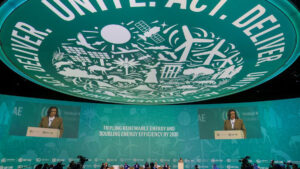Physical Address
23,24,25 & 26, 2nd Floor, Software Technology Park India, Opp: Garware Stadium,MIDC, Chikalthana, Aurangabad, Maharashtra – 431001 India
Physical Address
23,24,25 & 26, 2nd Floor, Software Technology Park India, Opp: Garware Stadium,MIDC, Chikalthana, Aurangabad, Maharashtra – 431001 India

By Aayushi Sharma
118 countries signed on to a pledge to triple installed renewable energy capacity by 2030 during the COP28 climate summit in Dubai.
China and India, biggest and fourth-biggest renewables generators respectively, did not sign the pledge of the bundling of the headline target of tripling renewables with doubling energy efficiency.
China, the US, Brazil, and India were the top four producers of renewable energy in 2022, where China ranked second with a capacity three times that of the US.
What is the agenda of the Global Renewables and Energy Efficiency Pledge?
The Global Renewables and Energy Efficiency Pledge, which was signed at COP28, aims to double the average yearly rate of energy efficiency improvements to more than 4% by 2030 and triple the installed capacity of renewable energy generation globally to at least 11,000 GW.
It pledges to make energy efficiency the “first fuel” at the center of all key investment decisions, planning, and policy decisions.
The UN Sustainable Development Goal 7 for “affordable, reliable, sustainable and modern energy for all” is acknowledged, with nearly 800 million people worldwide lacking access to electricity, of which nearly 600 million are in Africa. It also acknowledges the critical role that energy efficiency and renewables play in achieving this goal.
It also acknowledges that the deployment of renewable energy must be accompanied this decade by a rapid increase in energy efficiency improvements and the phase-down of unabated coal power, particularly ending the continued investment in unabated new coal-fired power plants, which is incompatible with efforts to limit warming to 1.5°C. This is in accordance with the findings of the IEA and IPCC.
What is India not committing to this global pledge?
According to Power Minister R.K. Singh, India already had installed capacity of almost 170 GW as of March 2023. As a result of tripling this, the 500 GW pledge is actually exceeded, however there is still debate worldwide regarding the true renewable nature of huge dams, which India views as renewable energy sources.
The pledge ensures that the deployment of renewable energy is accompanied by the phasing down unabated use of coal in generating power. This is the difficult scenario for India as its energy consumption heavily relies on coal power.
In India, coal is the most significant and available fossil fuel. It supplies 55% of the nation’s energy requirements. The nation’s industrial legacy was founded on its own coal. According to the Ministry of Coal, Over the past 40 years, India’s commercial primary energy consumption has increased by approximately 700%. India currently consumes roughly 350 kgoe of primary commercial energy year per person, far less than developed nations. India’s energy consumption is predicted to increase due to the country’s growing population, developing economy, and desire for a higher standard of living. Coal will remain a major player in India’s energy landscape due to the country’s limited supply of natural gas and petroleum reserves, restrictions on hydroelectric projects related to environmental protection, and the country’s geopolitical views on nuclear power.
Some experts showed disappointment that India had not signed on despite being visibly associated with the commitment.
According to Madhura Joshi, Senior Associate, India Energy Transition Lead, E3G, “It’s disheartening that India has not signed onto the global pledge to triple renewable and double energy efficiency by 2030. These were landmark decisions that were championed by the Indian G20 presidency and agreed to by G20 leaders in September 2023. Reaching net-zero commitments made by countries means that fossil fuels, including coal, need to be phased down and out.”
Dr. Nandita Das, Energy research and Policy Analyst, told CFC India that “India’s NDCs emphasize the development and deployment of renewable energy sources. Investing in oil refineries would divert financial and other resources away from renewable energy projects, slowing down the transition to cleaner energy. To achieve India’s NDCs and transition to a net-zero economy, it is crucial to prioritize investments in renewable energy, energy efficiency, and sustainable infrastructure while phasing out fossil fuel-based projects like new oil refineries.”
References:
https://www.cop28.com/en/global-renewables-and-energy-efficiency-pledge